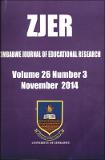| dc.contributor.author | Chifamba, Constance | |
| dc.coverage.spatial | Zimbabwe. | en |
| dc.date.accessioned | 2016-03-11T10:54:45Z | |
| dc.date.available | 2016-03-11T10:54:45Z | |
| dc.date.issued | 2014-11 | |
| dc.identifier.citation | Chifamba, C. (2014) A comparative study on the influence of formal (school) career guidance and non-formal (parents) career guidance on secondary school students' career decisions in Zimbabwe, Zimbabwe Journal of Educational Research, vol. 26, no.3, pp. 305- 320. Harare: HRRC. | en |
| dc.identifier.issn | 1013-3445 | |
| dc.identifier.uri | https://opendocs.ids.ac.uk/opendocs/handle/20.500.12413/9975 | |
| dc.description | A comparative study of career guidance options for secondary school students in formal and non-formal industries of Zimbabwe's employment sectors. | en |
| dc.description.abstract | This study sought to compare two major sources of career guidance, formal and non-formal career guidance. The researcher carried out a causa! comparative s/udv on 93 participants (currently employees in four different employing institutions). These participants were purposively selected from a population of four research sites in Harare; (ministry’ of education, ministry of health, business office and industry’). Each participant completed a 45-item, closed form questionnaire indicating their perceptions about the most influential source of the career guidance they received during secondary> school. The results were analyzed using SPSS. A Chi-square test was carried out to compare the expected and observed frequencies. A Chi-square value of 0.025 was obtained and therefore the hypothesis was rejected. There is a significant difference in the obsen’ed and expected numbers of individuals influenced by formal and non-formal career guidance. Almost twenty one percent (20.9%) of the participants indicated that they were influenced by formal career guidance whilst 44% reported to have been influenced by non-formal sources of career guidance. However 35.2% of the participants reported to have been influenced by both formal and non-formal sources of career guidance. Among these non-formal sources, parents emerged as the most influential sources of influence in the choice of a career by most secondary> school students. Schools, (through career guidance programs) were reported to be the second most influential sources of influence in career decisions by secondary school students. Since parents seem to be among the most trusted sources of career guidance, yet they do not have a formal channel of implementing their career guidance, it is therefore recommended that a collaborative approach to providing career guidance to secondary school students be adopted. A collaboration of the two major sources of career guidance, formal and non-formal career guidance, might most probably result in optimal career satisfaction levels for the student since he/she might get the best from both sources of career guidance. | en |
| dc.language.iso | en | en |
| dc.publisher | Human Resource Research Centre (HRRC), University of Zimbabwe (UZ) | en |
| dc.rights.uri | http://creativecommons.org/licenses/by-nc-nd/3.0/ | en |
| dc.subject | Children and Youth | en |
| dc.subject | Education | en |
| dc.subject | Work and Labour | en |
| dc.title | A comparative study on the influence of formal (school) career guidance and non-formal (parents) career guidance on secondary school students' career decisions in Zimbabwe | en |
| dc.type | Article | en |
| dc.rights.holder | University of Zimbabwe (UZ) | en |


